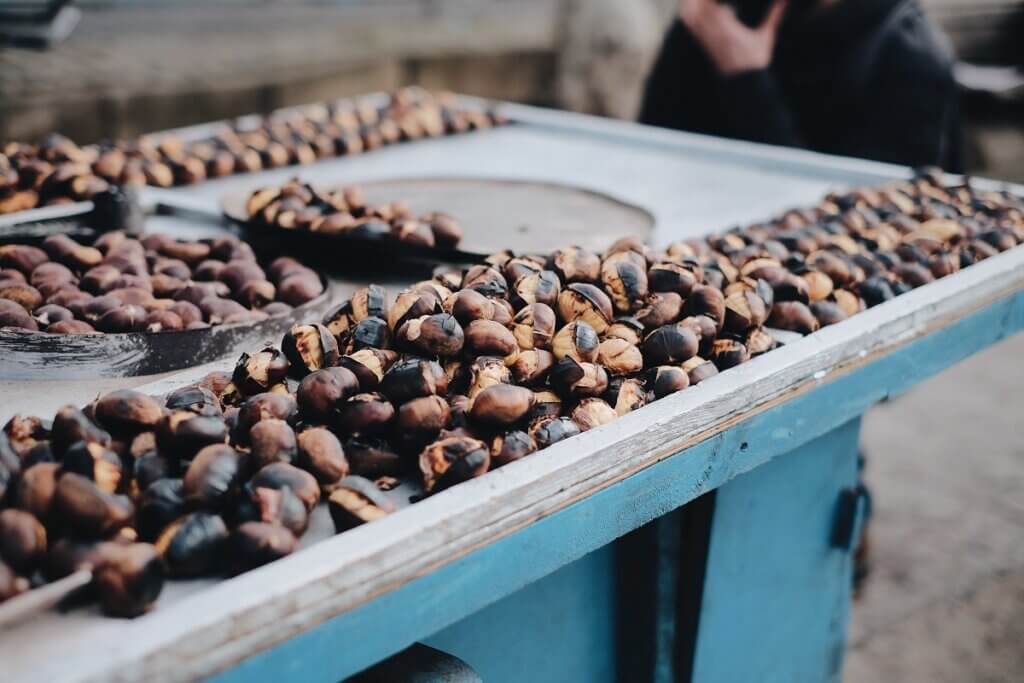Christmas can be hard work for people living with allergies. All the food shopping, parties, gifts you might be allergic to and all the festive traditions that you might miss out on. You probably won’t be able to eat the mince pies, chocolate money and chocolate treats on the tree, Christmas pudding, Christmas cake, brandy butter, bread sauce… the list goes on.
But you CAN do things to prepare and stay safe, and if things do go wrong, you can ride that out too. Here are some tips and tricks and survival tactics. Stay safe this Christmas.
Potential food allergy mistakes
Everyone makes mistakes. Even the most experienced allergy survivor can miss things. Here are a few things that you might fall foul of… things to check EVERY time. And then check again…
- Food allergen labels – Forgetting to check and double check food labels is top of the list. Even when I’ve checked for allergens in the shop, twice and checked at home before eating the food I still often miss allergens. Whether it’s a kind blindness, I’m just not concentrating, rushing or just really want to try this food. In my head I’m already eating it so it’s easy to miss sometimes.
- Not planning – It’s the busiest time of the year, with work xmas deadlines, social gatherings, cards to send, presents to buy, preparations for the big day, decorations and shopping for food. It’s a lot. So it’s not surprising that things slip through the military planning net. Did you forget to call that party venue ahead of time? or not manage to chat your hostess about what the menu will be? It’s hard being the difficult one, the allergic diner. People will understand though. Don’t take risks, check every ingredient and tell people you’re feeling very anxious about things.
- Having too much fun – Letting your guard down when you’re out, forgetting to check what that liqueur is made from, or not asking for the ingredients of the gluten free bread. Don’t beat yourself up. If you find you are taking some risks because you’re not in the right mind space, take a step back. Think about how you could avoid near misses in future and put plans in place to help you be more prepared in future.
- Not asking for help – It can make you really anxious but don’t suffer in silence. Reach out to people and tell them you find it hard to trust them, and difficult to try new things at times of stress like Christmas. and eat the wrong things.
- Trusting the wrong people – You learn with experience who to trust. Not everyone fully understands the complexities of food allergies and the many areas where mistakes can be made. You will learn from our mistakes, it’s a hard lesson to learn. But over time you’ll be able to spot the glazed look, the overconfident person, when they don’t ask the right questions. Again, it’s not your fault, just learn from your mistakes.
- Crisp bowls – Snacks, crisps etc. can be refilled without you seeing and you will have no idea what was in there previously and what’s just gone in once it’s out of the bag. Try to avoid these bowls of unmarked snacks and only have them if you’re 100% sure you have checked they are safe.
It can be exhausting staying safe and particularly at Christmas. Finding Christmas traditions that don’t revolve around food can help. If you’re planning meet ups with friends, suggest a walk, staying home to watch xmas movies, or a shopping trip. If they love you won’t mind that the food options are triggering for you.
Tips for surviving Christmas with allergies
Here’s a few things that I do to ensure I’m OK, and stay safe when I’m not in the mood for the military planning…
- Cancel – It’s OK to say No. If you are really feeling anxious it can often be the right thing to do. Trust your gut instincts and if you are in such high alert that you can’t enjoy things or relax be kind to yourself.
- Eat beforehand – I often do this. You don’t need to apologise; just tell the person you won’t be there for the food but can you pop by after? Eat a hearty meal, take snacks and go knowing you will be safe. You can even take your own safe drinks.
- Offer to help – If you’re totally unprepared for that dinner invitation, tell them how anxious you feel and offer to go early to help. That way you can help your friend AND be there to discuss all ingredients and check all the packets. I’ve never met a friend yet who wasn’t anything but grateful.
- Offer to take your own food – Don’t feel like this an insult if someone asks you to do this. It can often be the safest option if they’re not geared up for catering and can’t get their head around what to give you. Ask for the menu ahead of time and try to get yourself similar safe options. Or get your favourite safe party foods and just own it. Be proud. No apologies required. You’re keeping yourself safe.
- Find safe alternatives – Scour the supermarkets and stock up mince pies, treats etc. There are often some great things at the supermarket free from aisles. Get a store of Violife Cheese (their Camembert is to die for and vegan and dairy free) and your favourite crackers and you’ll not feel left out
- Host yourself – Gives you the control and you can have a completely allergen free house.
- Watch out for nuts – Christmas can sometimes be a little nut heavy! A lot of the traditional recipes contain nuts and they’re just everywhere sometimes. Garnishes and added to make something otherwise safe festive. I’ve seen almonds in the sprouts before, and nuts in the stuffing often. In winter and around Christmas you also get those roasting chestnuts… cross the road and be aware of these if you have an airborne nut allergy.
- Other people eating nuts – You know those people who shovel peanuts into their mouth and wipe their hands on their clothes. Then reach out to hug you in welcome! Ideally ask friends to not have nuts if you’re going, but if they are there, be hyper vigilant of who is eating them and stay far as possible from them.

If allergy mistakes happen – be prepared for recovery
- Give me drugs – Make sure you have stocked up on all the drugs you need well before Christmas. Check you have enough anti-histamines and the expiry date on your EpiPen and order a new one if you need to. If you use an inhaler make sure you have enough to see you through the festive season. Nasal sprays and eye drops can also help if you suffer particularly from excess mucus during an allergic attack. Stock up your favourite skin care creams in case of a flare up over the festive period. Don’t be left short of the products you need at Christmas when delivery times can vary.
- Ice it – I’ve got an amazing, chilled face mask and Cosi Care stars (if you have a nickel allergy the stars are nickel free) which live in my freezer. It’s invaluable when I have an allergic reaction as it cools and soothes the burning feeling on my skin. You can use the plastic freezer bag packs or failing that a bag of frozen peas or ice cubes packed into a plastic bag. Make sure you put the ice pack back into the freezer straight away so you can have another soothing chilly compress later on if you need to. A cool bath can also help if you are feeling really hot and bothered and your skin has erupted all over your body – it’s rather unpleasant, and chilly… but worth it as it can really calm down itchy skin. Jade rollers kept in the freezer can also feel wonderful on hives and allergy rashes.
- Tackle the pain – If you had a headache, you wouldn’t think twice about popping a paracetamol or ibuprofen would you? Don’t be hard on yourself if you have an allergic reaction, take a pain killer and it will really help you get over the early agonising itching stages of an attack.
- Feet up and chill – If you can put your feet up, this really helps; if you’re at work, have kids to look after etc. this might not be possible but if you can let your friends and family know you need some space for an hour or so it works wonders. Sneak up to your bedroom, or a quiet place. Lay down with the ice pack, having taken a pain killer and anti-histamines and relax. Think happy thoughts and imagine your ravaged skin all healed and back to normal; play some soothing music, turn down the lights and relax.
- Drink plenty to hydrate – Drink plenty of water, you need to replenish your body’s stock of rehydrating liquids and water is the best way of doing this. You could also have a relaxing camomile, nettle or redbush tea. There are lots of herbal teas that can help with allergies and anxiety. Read the 10 best teas for allergies.
- Moisturise – Keeping your skin moisturised is vital, don’t stint on this when you have an allergic reaction. Bathe and clean your hands and face, or wherever affected, just in case it’s something you’ve transferred on your hands. Apply your chosen moisturiser liberally and keep applying it often. You may feel a bit slimy and uncomfortable for a while, but it really helps your skin to recover. Try a little bit of 99% Aloe Vera gel on your skin, then cover with something oily like Epaderm to seal in the moisture. Aloe Vera is a natural healer. Tea Tree oil is also really good to prevent bacterial infections. I’ve now switched to Lyonsleaf and Balmonds balms to seal in moisture to my skin.
- Healing supplements – There are many things that can help an allergic reaction such as herbs and plants that can help boost your immune system or alleviate the blocked-up stuffiness of the excess mucus that can be created. Take some Echinacea, Grape Seed extract, Evening Primrose or Borage, Stinging nettle or milk thistle. An extra boost of zinc, calcium, magnesium and other vitamins will also help give the skin a helping hand to recover.
- Avoid it happening again – Can you think back to what caused your reaction? If you aren’t sure write down all the possible offenders, what did you eat, where have you been, what have you used or done differently recently? For example you might have bought a new shower gel, washing powder or soap, or a different brand of sauce; check the ingredients and if you can, do a safe test on a small area of your skin to see if you react. Once you’ve pinned down the culprit do whatever you can to avoid it happening again to you or anyone else and take precautions. If you really aren’t sure, speak to you doctor about having some food allergy tests done at your local allergy clinic.
- Take photos – I’ve started to photograph my allergic reactions, then save the photo by date and what I think caused it. It can be really useful to show previous reactions to your doctor and also help you document the advancement or progress of your allergic reactions; are your reactions getting better, worse, or changing? What’s causing them? Get someone to take a picture when the reaction is at its worst; you’ll be amazed when you look back afterwards and you never know when the photo will come in handy.
- Know your skin – Most of all get to know your skin; keep a symptoms and mood diary where you record what you ate, how you felt and any changes, rashes or reactions. You will soon learn to recognise any tiny changes early and so start your coping regime earlier and minimise the symptoms. It will help you in the long run to identify things you are intolerant to and allergic to. If you suffer any infection or blistering this could be serious and you should go and see your doctor or allergy specialist right away.
- Reorder medication – If you had to use your adrenaline autoinjector, order a new one straight away. There can be delays getting hold of them so don’t hang about. You can phone the surgery to get a rushed prescription. Tell them it’s an emergency and they should be able to organise it the same day.
I hope that none of you have an allergic reaction this Christmas, but we all make mistakes, and it’s especially hard during holidays like Christmas when we relax, are invited to parties, friends’ houses to generally eat drink and be merry. If the worst does happen, make sure you are prepared to act fast, minimise the symptoms and return to the festivities as fast as you can. The local pharmacy, doctors’ surgeries and your allergy specialist will probably have a Christmas holiday too so don’t get caught short with no way of getting help.
Happy Christmas from Whatallergy.com












Leave a Reply